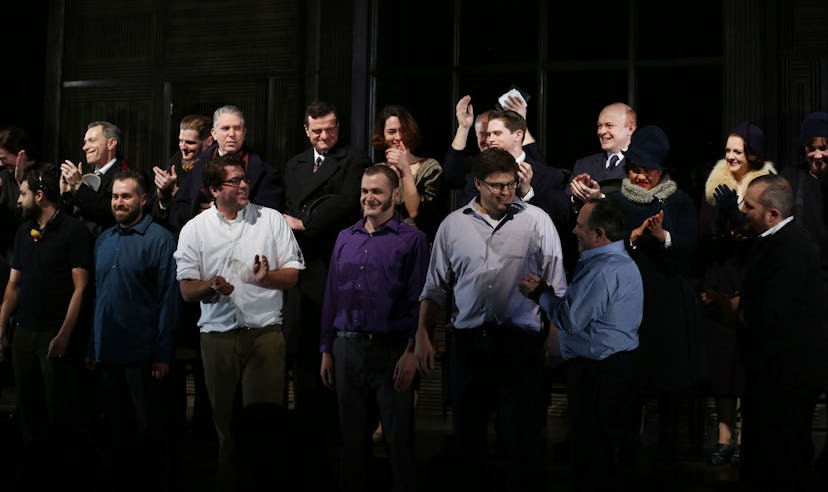Machinal’s Opening Night

Any actress, even one as accomplished as Rebecca Hall, could be forgiven for suffering from nerves on the eve of her Broadway debut. Well, the British film and theater star got an extra helping of drama Thursday night at the opening of her performance in Sophie Treadwell’s 1928 play “Machinal” at the American Airlines Theater.
Having attended a preview performance a week prior, I thought something was awry in the first scene of the 100-minute work when the dark shadowed masses in a subway car failed to morph smoothly into a lively office setting, punctuated by the staccato of typewriters. See this Roundabout Theatre Company production of “Machinal,” which follows a meek young stenographer who finds her loveless marriage so unbearable she kills her husband and ends up in the electric chair (it is based on the true story of Ruth Snyder who died in Sing Sing in 1927), completely depends on Es Devlin’s magical set design, a rotating box that spins to reveal the scenarios of its protagonist’s ever-devolving life. Inasmuch as it is a metaphor for the whirling machine in which she is trapped, it is also the literal force behind the play’s movement: without it, the show cannot go on. Or can it?
After a few protracted attempts, the lights came up and a technical team got to work while the guests and celebrities in attendance hit the then open bar. One can only imagine what Hall and the ensemble cast did to douse their jitters.
An hour and a half after the play’s start time, with everyone back in their seats, the director Lyndsey Turner took to the stage, explaining that one of the motors had broken. And then came the biggest surprise of the night:
“We feared we wouldn’t be able to deliver you this play… Sophie Treadwell has waited 83 years to get back on Broadway and all at the Roundabout, myself included and our wonderful cast, feel quite frankly fucked if that’s going to happen on our watch,” she said to raucous encouragement. “We are going back to the oldest trick in the book: muscle.”
And so the cast filed back onto the stage in their first scene costumes and started the play over, while eleven volunteers physically rotated Devlin’s design for the next 100 minutes as seamlessly as if its motor had been fixed. It was perseverance, dedication, and poise in its purest form. When the intermission-free performance came to a close, there was the expected standing ovation, not just for the actors, but the men and women who muscled “Machinal” through its opening night.
What makes an evening at the theater so special is the contract made between performers and the audience, the implicit understanding that we are all willing participants in a night of living, breathing storytelling, whatever may come. It is a pact worth fighting for, no matter how seemingly insurmountable the challenges.